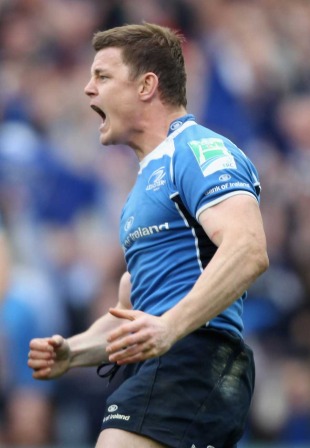|
Comment
Reason to believe
Hugh Farrelly
May 3, 2011

Leinster skipper Brian O'Driscoll has been at the heart of his province's headline-grabbing performances this season
© Getty Images
Enlarge
It is little over two years since Ireland landed the Grand Slam but, four months out from the Rugby World Cup, the team's dominant influences have changed utterly. Comparing that 2009 side with the likely starting XV at New Zealand 2011 reveals as much. When Declan Kidney's side squeezed past Wales in Cardiff, his former charges Munster provided more than half the players. Marcus Horan, Jerry Flannery, John Hayes, Donncha O'Callaghan, Paul O'Connell, David Wallace, Tomas O'Leary and Ronan O'Gara were the 'Munster 8' that day while provincial colleague Denis Leamy played 74 minutes in the back-row following Stephen Ferris's early injury. Leinster had five players in the side with only one (Jamie Heaslip) in the pack. Ireland were the top country in Europe while Munster were European champions and the High Kings of Ireland. Within two months, that situation had begun to change. Leinster destroyed Munster in the Heineken Cup semi-final and went onto claim their first European title. They are on the verge of their second if they can overcome the frightening physicality of Northampton in Cardiff at the end of the month. Meanwhile, Munster have flopped out of the Heineken Cup at the pool stages for the first time in 13 years and then the Challenge Cup at the semi-final stage last weekend. Those contrasting fortunes are reflected in the make-up of the Ireland side that will attempt to reach the semi-finals of the World Cup for the first time later this year. The provincial scenario has been flipped on its head and now it is Leinster who dominate selection - to an even greater degree than Munster two years ago. The 'Leinster 10' of Cian Healy, Mike Ross, Sean O'Brien, Heaslip, Eoin Reddan, Jonathan Sexton, Gordon D'Arcy, Brian O'Driscoll, Luke Fitzgerald and (soon to return) Rob Kearney constitute two thirds of the team (including four forwards) with Munster potentially reduced to just three players (O'Callaghan, O'Connell and Wallace). Ulster's Rory Best and the Ospreys' Tommy Bowe make up the 15. Furthermore, two more Leinster players - second-row Leo Cullen and blindside flanker Kevin McLaughlin - could put on serious pressure for starting places come September although their Munster rivals, O'Callaghan and Wallace, have had good seasons. So, with Leinster's improvement over the past two years forcing a personnel change, the task now for Kidney is to tap into the exuberance that has marked the province's displays this season. That was achieved in the Grand Slam-denying stuffing of England in their final Six Nations clash at Lansdowne Road when Ireland found the tempo and gaps that Joe Schmidt's side have been locating since October. Perhaps the most vital ingredients in Leinster's make-up this season have been their self-belief and confidence, areas where Ireland appeared less than convincing in the Six Nations prior to the England game. If Kidney can continue to infuse his men with that psychological surety during their World Cup campaign then he is in business. While mindful of the fact that Ireland's picture looked particularly rosy at this juncture prior to their last, disastrous, World Cup adventure, there are genuine reasons for Irish optimism at this point - stemming primarily from Leinster's impressive progress.
The question of translating that into Ireland's performances remains a live, but negotiable, one. During the Six Nations, it took Kidney's men four games to locate a complete performance which they produced against England. The Ireland coach has four warm-up matches in August to brush off the summer cobwebs and get things clicking. It also helps that these are proper Tests against Scotland, France (twice) and England rather than the haphazard run-in to the last World Cup, which included a hastily thrown-together clash with Bayonne. By the time Ireland see off Eddie O'Sullivan's USA Eagles in their opening Pool C clash at New Plymouth, they should be nicely in tune and ready for the decisive showdown with Australia in their second outing in Auckland. It still may not be enough to get past the Wallabies but the displays of Leinster this season, particularly last weekend's defeat of Toulouse, has shown that Ireland have the players to be a major force at the World Cup and opponents the Tri Nations countries will be wary of. There were few complaints emanating from Toulouse in the wake of their 32-23 semi-final defeat to Leinster while coach Guy Noves could not have been more gracious when paying tribute to the victors in the immediate aftermath. Toulouse and their supporters knew that the champions had given their all and played a high quality game only to be undone by a superior force with a style of play - abrasive up front, inventive out wide - that will do well against the southern hemisphere heavyweights. It all bodes well for Ireland later this year and that semi-final spot certainly looks within their reach. Ireland winning the competition may still sound outlandish but, at odds of 25-1 and driven by Leinster's brio, Ireland's World Cup bid has acquired considerable appeal. © ESPN Sports Media Ltd.
| |||||||||||||||
Live Sports
Communication error please reload the page.
-
Football
-
Cricket
-
Rugby
-
- Days
- Hrs
- Mins
- Secs
F1 - Abu Dhabi GP
Abu Dhabi Grand Prix December 11-131. Max Verstappen ()
2. Valtteri Bottas (Mercedes)
3. Lewis Hamilton (Mercedes)
4. Alexander Albon ()
5. Lando Norris ()
6. Carlos Sainz Jr ()
-
ESPNOtherLive >>
Golf - Houston Open
Snooker - China Open
Tennis - Miami Open

